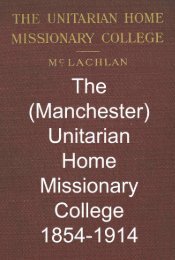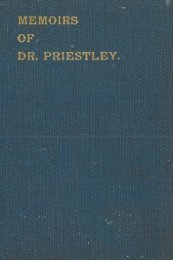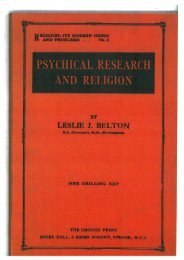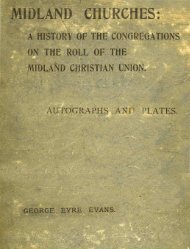Essays in Unitarian Theology by Kenneth Twinn Lindsey - General ...
Essays in Unitarian Theology by Kenneth Twinn Lindsey - General ...
Essays in Unitarian Theology by Kenneth Twinn Lindsey - General ...
Create successful ePaper yourself
Turn your PDF publications into a flip-book with our unique Google optimized e-Paper software.
26 ESSAYS IN UNITA~IAN THEOLOGY BELIEF IN GOD<br />
and once any doubt on the po<strong>in</strong>t arises, then he<br />
obviously loses the value of God. For Ritschl, the<br />
Christian revelation was true because it worked. But<br />
many people do not want to know whether it works.<br />
They want to know whether it is true. In any case,<br />
how can we tell whether Christianity " works " unless<br />
we are first agreed on the nature and dest<strong>in</strong>y of man<br />
and the purpose of the universe ?<br />
4.<br />
Traces of kitschlianism still persist, despite the con-<br />
temporary repudiation of the Liberalism which sprang<br />
A<br />
from it. ~udolf Otto's famous book, The Idea of the<br />
Holy, is, <strong>in</strong> some respects, an off-shoot of the Ritschlian<br />
school-though it should be noted to Otto's credit that<br />
V<br />
he does <strong>in</strong>sist that religion demands convictions about<br />
the nature of the world. The contention of many<br />
psychological pragmatists. that it does not matter<br />
whether religion is true or not so long as it is useful, is<br />
also good ~itschlianism. Perhaps we can see the ghost<br />
of Ritschl, too, <strong>in</strong> that modern example of theological<br />
escapism which takes the form of a tentative acceptance<br />
of the strictures of what was once called Logical<br />
Positivism, but is now more often known as l<strong>in</strong>guistic<br />
analysis. L<strong>in</strong>guistic analysis, with its <strong>in</strong>sistence that<br />
the language of theology is at best prescriptive and - not<br />
descrl ptive, and at worst mere nonsense, stems, <strong>in</strong> a<br />
sense, from Kant's repudiation of metaphysics, though<br />
bv a different route from that which runs through<br />
~chleierrnacher and Ritschl-and just as Kant accepted<br />
the criticism of Hume and attempted to f<strong>in</strong>d<br />
some other ground - of belief, so some modern liberals<br />
are auite prepared to surrender to the onslaught of<br />
. -<br />
l<strong>in</strong>guistic analysis. It may very well be, they say <strong>in</strong><br />
effect, that the language of theology is nonsense-but<br />
this does not necessarily <strong>in</strong>validate religious belief. It<br />
merely serves to rem<strong>in</strong>d us that we must seek some non-<br />
metaphysical basis for religion-a basis such as feel<strong>in</strong>g<br />
or experience-the direct encounter with God, or the<br />
num<strong>in</strong>ous awareness which comes at moments of crisis<br />
<strong>in</strong> the cycle of human life.<br />
'Unfortunately, this attitude ignores the all-important<br />
fact that the l<strong>in</strong>guistic analysts are not the only ones<br />
who are sceptical of religious belief. There are also<br />
the psychological analysts, and they are just as ready<br />
to dismiss so-called religious experience as their philo-<br />
sophical colleagues are to dismiss metaphysical state-<br />
ments. What guarantee have we, after all, that so-<br />
called religious experience-even the encounter with<br />
God-is anyth<strong>in</strong>g more than a neurotic delusion?<br />
And what about the man who says that he has no such<br />
experiences? Are we to conclude that religion has no<br />
claims upon him? To accept certa<strong>in</strong> modern critiques<br />
- -<br />
of religion, and ignore the equally cogent psychological<br />
critiques, is clearly a case of special plead<strong>in</strong>g. If it be<br />
argued, on the other hand, that the psychologists have<br />
not made out their case, cannot the same be said of the<br />
philosophers ? In other words, we ought to be pre-<br />
pared to challenge not only the psychologists, but also<br />
the philosophers as well. The defeatist notion that '<br />
rational argument has no place <strong>in</strong> religion must be<br />
rejected. As Professor Leonard Hodgson has po<strong>in</strong>ted<br />
-<br />
out, all real progress <strong>in</strong> religion has always depended<br />
upon the appeal to reason and conscience. The essen-<br />
tial unreasonableness of contemporary religion was,<br />
for example, the constant theme of the Hebrew<br />
prophets, and it was thanks to their <strong>in</strong>fluence that<br />
a higher and a more reasonable religion ultimately<br />
27






